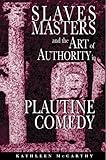Slaves, Masters, and the Art of Authority in Plautine Comedy / Kathleen McCarthy.
Material type: TextPublisher: Princeton, NJ : Princeton University Press, [2009]Copyright date: ©2000Edition: Course BookDescription: 1 online resourceContent type:
TextPublisher: Princeton, NJ : Princeton University Press, [2009]Copyright date: ©2000Edition: Course BookDescription: 1 online resourceContent type: - 9780691117850
- 9781400824700
- 872.01
- online - DeGruyter
- Issued also in print.
| Item type | Current library | Call number | URL | Status | Notes | Barcode | |
|---|---|---|---|---|---|---|---|
 eBook
eBook
|
Biblioteca "Angelicum" Pont. Univ. S.Tommaso d'Aquino Nuvola online | online - DeGruyter (Browse shelf(Opens below)) | Online access | Not for loan (Accesso limitato) | Accesso per gli utenti autorizzati / Access for authorized users | (dgr)9781400824700 |
Frontmatter -- Contents -- Preface -- Abbreviations and Conventions -- Chapter I. The Crowded House -- Chapter II. The Ties That Bind: Menaechmi -- Chapter III. Love's Labour's Lost: Casina -- Chapter IV. A Kind of Wild Justice: Persa -- Chapter V. Truth Is the Best Disguise: Captivi -- Conclusion. The Slave's Image in the Master's Mind -- Works Cited -- Index of Plautine Passages -- General Index
restricted access online access with authorization star
http://purl.org/coar/access_right/c_16ec
What pleasures did Plautus' heroic tricksters provide their original audience? How should we understand the compelling mix of rebellion and social conservatism that Plautus offers? Through a close reading of four plays representing the full range of his work (Menaechmi, Casina, Persa, and Captivi), Kathleen McCarthy develops an innovative model of Plautine comedy and its social effects. She concentrates on how the plays are shaped by the interaction of two comic modes: the socially conservative mode of naturalism and the potentially subversive mode of farce. It is precisely this balance of the naturalistic and the farcical that allows everyone in the audience--especially those well placed in the social hierarchy--to identify both with and against the rebel, to feel both the thrill of being a clever underdog and the complacency of being a securely ensconced authority figure. Basing her interpretation on the workings of farce and naturalism in Plautine comedy, McCarthy finds a way to understand the plays' patchwork literary style as well as their protean social effects. Beyond this, she raises important questions about popular literature and performance not only on ancient Roman stages but in cultures far from Plautus' Rome. How and why do people identify with the fictional figures of social subordinates? How do stock characters, happy endings, and other conventions operate? How does comedy simultaneously upset and uphold social hierarchies? Scholars interested in Plautine theater will be rewarded by the detailed analyses of the plays, while those more broadly interested in social and cultural history will find much that is useful in McCarthy's new way of grasping the elusive ideological effects of comedy.
Issued also in print.
Mode of access: Internet via World Wide Web.
In English.
Description based on online resource; title from PDF title page (publisher's Web site, viewed 08. Jul 2019)


